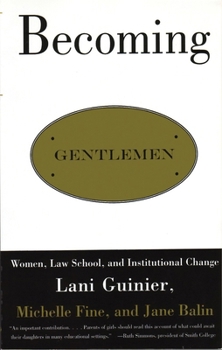Becoming Gentlemen: Women, Law School, and Institutional Change
Select Format
Select Condition 
Book Overview
"The challenge, then, is not to invent new victims or new scapegoats but to mobilize America for the future. What would it take to ensure that all of us can succeed at getting the job done, the problem solved, and the future more secure?" As a student at Yale Law School in 1974, Lani Guinier attended a class with a white male professor who addressed all the students, male and female, as "gentlemen." To him the greeting was a form of honorific, evoking the values of traditional legal education. To her it was profoundly alienating. Years later Guinier began a study of female law students with her colleagues, Michelle Fine and Jane Balin, to try to understand the frustrations of women law students in male-dominated schools. Women are now entering law schools in large numbers, but too often many still do not feel welcome. As one says, "I used to be very driven, competitive. Then I started to realize that all my effort was getting me nowhere. I just stopped caring. I am scarred forever." After interviewing hundreds of women with similar stories, the authors conclude that conventional one-size-fits-all approaches to legal education discourage many women who could otherwise succeed and, even more, fail to help all students realize their full potential as legal problem-solvers. In Becoming Gentlemen Guinier, Fine, and Balin dare us to question what it means to become qualified, what a fair goal in education might be, and what we can learn from the experience of women law students about teaching and evaluating students in general. Including the authors' original study and two essays and a personal afterword by Lani Guinier, the book challenges us to work toward a more just society, based on ideals of cooperation, the resources of diversity, and the values of teamwork.
Format:Paperback
Language:English
ISBN:0807044059
ISBN13:9780807044056
Release Date:December 1997
Publisher:Beacon Press
Length:192 Pages
Weight:0.88 lbs.
Dimensions:0.5" x 6.0" x 9.0"
Customer Reviews
2 ratings
Outstanding (and current) analysis
Published by Thriftbooks.com User , 16 years ago
The reviewer "A Customer" must be either anti-feminist or professionally jealous. (I am a law professor myself as Lani Guinier is.) The relevancy of her book , today in 2008, is evidenced by a forthcoming empirical survey study about Chicago-Kent law students by Felice Batlan, et al "Not Our Mothers' Law Students" forthcoming in University of Baltimore Law Forum, Spring 2009. (And no, I am not Professor Batlan either -- but I heard it presented at a conference and found it quite exceptional empirical work -- I am a statistician by training.)
Excellent review of law school
Published by Thriftbooks.com User , 24 years ago
As a lawyer who graduated from a good law school in the 1980's, I found this book to be excellent. The findings resonnated with my own law school experience, which was alienating at best and miserable at worst. I was finally able to make sense of what happened to me in law school and why I found the work so frustrating. I was taught to be competitive and my nature was more compromising. As my experience and that of so many others who have worked in the court system, a lawyer's best skill is negotiation. The vast majority of cases filed in court today are settled. Those skills could be developed in law school more than the aggressive winner takes all approach. I'm glad I read this book. It is not for casual readers, but I would highly recommend it for any women lawyer or women who is even thinking of going to law school.





